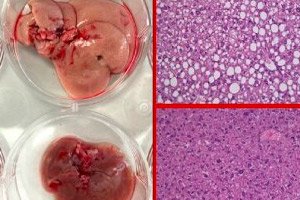
All iLive content is medically reviewed or fact checked to ensure as much factual accuracy as possible.
We have strict sourcing guidelines and only link to reputable media sites, academic research institutions and, whenever possible, medically peer reviewed studies. Note that the numbers in parentheses ([1], [2], etc.) are clickable links to these studies.
If you feel that any of our content is inaccurate, out-of-date, or otherwise questionable, please select it and press Ctrl + Enter.
T-cell dysfunction increases cancer risk in obese people
Last reviewed: 02.07.2025
 ">
">Researchers from Saint Louis University School of Medicine say T cell dysfunction leads to an increased risk of cancer among obese people.
T cells are white blood cells called lymphocytes that play an important role in the immune system, helping fight infections and cancer. Ryan Teague, PhD, a professor of molecular microbiology and immunology at Saint Louis University, and his team are investigating why obesity causes T cell dysfunction and weakens immune surveillance, the body’s ability to identify malignant cells and destroy them before they become tumors.
A study led by Teague and co-authored by Alex Pining, a student in the MD/Ph.D. program at Saint Louis University, published in Nature Communications, found that obesity-associated T-cell dysfunction interferes with T-cell recognition of tumor cells, increasing the risk of tumor development in obese mice when exposed to a carcinogen. Teague and his team are now trying to unravel the precise mechanism by which obesity-associated metabolic abnormalities directly impact T-cell function.
Current projects in Teague’s lab at Saint Louis University focus on identifying barriers to successful cancer immunotherapy and developing strategies to overcome these barriers to improve patient outcomes. Teague and his team are investigating how obesity affects the effectiveness of immunotherapy.
"Immunotherapy boosts a patient's immune system by targeting and reviving T cells. Paradoxically, immunotherapy is often more successful in obese patients, where the immune system doesn't work as effectively," Teague said.
"Our study explains this paradox by showing that in the obese setting, developing tumors only need to evade the weakened immune system. Such tumors are poorly adapted to evade the reactivated T cells induced by immunotherapy and are therefore more easily destroyed."
Teague noted that single-cell RNA sequencing played a key role in the study's findings, allowing scientists to learn what's going on inside individual immune cells in tumors.
"We learned that the dysfunction of these T cells was their inability to kill tumors. These genes were not activated. The problem was also their inability to acquire the metabolic functions needed to maintain antitumor activity," Teague explained.
